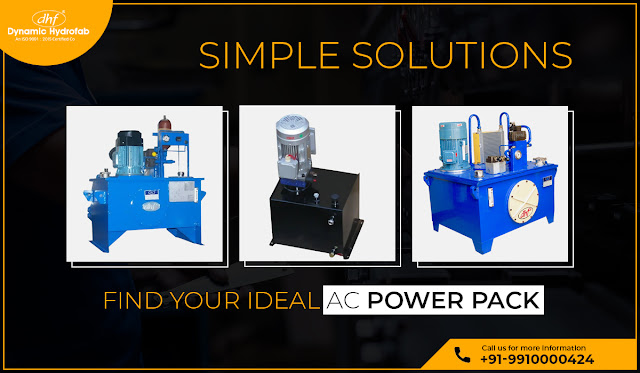Simple Solutions: Find Your Ideal AC Power Pack
AC power packs are
widely used to power hydraulic systems. It's a reliable and efficient solution
for most industries. These power packs are key components in many fields,
driving hydraulic machinery and equipment with their necessary energy. Several
factors, including capacity, voltage, features, and reliability, must be
considered before you find the ideal AC power pack to meet your own needs.
This guide assists in that decision-making process by presenting the main
considerations when looking for an effective solution for AC Power Pack India.
After you start
considering an AC power pack, it is
necessary to evaluate your power needs. Such as the type of hydraulic equipment
to be operated, how much power it needs, and so on. Add up all your power needs
to ensure that any AC power pack you
select can handle the load properly, especially if you are using a
variable-frequency drive. An understanding of your power needs beforehand will
facilitate this process of choosing and prevent either having things that are
too weak or too strong.
Voltage
and Phase:
AC power packs are
available with multiple voltage and phase configurations to meet different
electrical systems. Determine which voltage and phase your present system can
cope with, or the specifications of hydraulic equipment you possess. Standard
voltage choices include 110V, 220V, 380V, and 440V; typical phases are
single-phase and three-phase. If you choose the right voltage and phase, then
both the compatibility and performance of the power pack ought to be assured.
Assess
Capacity and Flow Rate:
When selecting an AC power pack,
you should remember that capacity and flow rate are two important factors. The
word capacity refers to how much hydraulic fluid can be stored in the power
pack at most; flow rate indicates the quantity of fluid released in a given
period.
Evaluate
built-in features:
Several built-in
features turn up on today's AC power
packs, designed to improve functionality, make the equipment safer, and
improve the efficiency of operation. Look for features such as pressure gauges,
overload protection, thermal protection, and variable pressure settings. These
features provide a fine degree of control, provide the means to monitor the
state of the hydraulic system, and safeguard its functioning.
Review
Portability and Installation Options:
Check the portability
and installation requirements of your power pack. If you have to move or locate
it in different places, are there any special restrictions on this? Look for
designs that allow for easy transport and installation and are compact and
lightweight. Furthermore, examine the mounting options and whether they are
compatible with your workspace or the equipment's layout.
Prioritize
durability and reliability:
When you are choosing
an AC power pack for industrial use, your primary consideration should be
durability and reliability. Look for bulky, powerful units that are built of
strong parts and cobbled together with the minimum number of assembly lines.
Research well-known brands that have become famous over time for producing
hard-core yet incredibly reliable power packs that keep plugging away at top
performance far beyond any expectations one might have had when they first
bought them.
Also Read:- Power up With Precision: AC
and DC Power Packs in India
Assess
Cost and Value:
Also, check what the
value of that AC power pack is. Although cost is important to some extent,
concentrate on the overall value of your AC power pack. Compare prices between
different manufacturers or suppliers by such criteria as quality, features,
guarantees, and post-sales service. Choose an AC power pack or DC Power Pack that is value for money
and delivers performance like that which you expect from your investment.
Remember, too, that a superior power pack will save you money in the long run
because of its higher efficiency and reliability.
Conclusion:
The choice of AC power pack that best suits your
particular style of work comes from carefully gauging all these elements: power
requirement, voltage, capacity, characteristics, stability, safety, and
purchase price. When you take these all together into account and in line with
your operational needs, you will be able to choose a Compact Power pack that meets standard NBR 12 and gives you
constant high performance with reliable, low-cost operation for the whole
hydraulic system.











Post a Comment